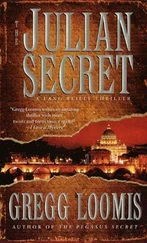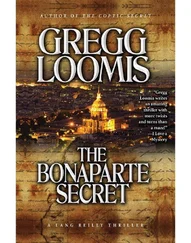9. The hyperbole here is Pietro's, not the translator's.
10. There are no consistent records as to the number of ships owned by the Templars, but it is unlikely that the entire fleet would have been at an obscure Sicilian port at once or that all the ships in port would have been theirs.
Atlanta
The same day
Morse was slouched in his chair, studying another fax, this one from the Department of Defense, Bureau of Records, St. Louis.
Reilly's dates of service matched what Morse remembered him saying, even confirmed a· bullet lodged between the seventh and eighth cervical vertebrae. If Morse understood the medical jargon correctly, the examining doctor had adopted an attitude of "if it ain't broke, don't fix it." Attempting surgery to cut the damn bullet out could sever some nerve with a long name. Made sense.
Morse sat up so suddenly the casters on his chair slammed against the gray carpet with a thud, causing the detective in the cubicle next to his to look up from her computer with a glare.
"C-seven and C-eight?" he said to no one in particular before he picked up the phone and dialed the medical examiner's number from memory.
The first person he spoke to confirmed his suspicion: There was no eighth cervical vertebra. The thoracic spine began after the seventh cervical disk.
Mistake?
Could be.
He reached into the inside pocket of the suit coat draped over the back of his chair and produced his notebook. It didn't take long to find the number for Reilly's office. Now, if he could just get the minimal cooperation if the lawyer's secretary…
Atlanta: Offices of Arnold Krause, MD.
Morse hated doctors' offices even when he was not a patient. The worn and outdated magazines and the cheap furniture were almost as bad as the receptionist's, "The doctor'll be right with you," a promise uniformly and cheerfully given but rarely kept. He had a theory that there was a school somewhere that recycled lobotomy patients to work the hunt desks of physicians' offices.
His badge made a difference. He hardly had time to settle in with a month-old copy of People before he was ushered into an office where diplomas and certificates covered more of the walls than the dark paneling.
"Arnold Krause." A short man in a white coat entered the room right after Morse and circled him to stand behind a desk and extend his hand. "Understand you're interested in Mr. Reilly's records."
Morse savored the nervousness most people exhibited around policemen. "That's right, Doctor. There be no doctor-patient privilege in Georgia…"
Krause plopped into a leather chair behind the desk and slid a manila folder and a large envelope across the polished mahogany. "As I'm well aware. Still, we don't usually turn over medical records without a subpoena. But where a patient is subject to an investigation…"
Morse sat in a wing chair across the desk and began to thumb through the file. "I appreciate your not insisting on the formalities."
"We try to cooperate with law enforcement," the doctor said, closely watching where Morse directed his attention.
Morse read the typed notes of last fall's physical. Reilly seemed to be in good health. Impatiently, he opened the envelope, dumping X-rays onto the desk. He held them up one by one to the light from the office's only window until he found the one he was looking for.
He handed it to the doctor. "This be the neck, right?"
Krause whirled in his chair to place the X rayon a viewer built into the wall. Fluorescent light flickered and came on. "The bottom of the cervical spine, yes. Actually, the picture is a chest X-ray."
It was obvious the doctor wanted to ask why Morse wanted to know.
Morse ignored the implicit question. "And there be no foreign objects imbedded in Mr. Reilly's cervical spine, right?"
The doctor's face wrinkled into a puzzled frown. "Foreign object? Like…?"
"Like a bullet."
The doctor paled visibly. "A bullet?"
Morse leaned across the desk. "What I said, a bullet. If one were there, we'd see it, right?"
Krause nodded. "I'd certainly think so. But why…?"
"In your examination of Mr. Reilly, you never saw a scar, anything that would indicate he'd either been shot there or had a bullet removed?"
The doctor shook his head. "No, nothing. But why…?"
Morse stood, hand extended. "You've been very helpful, Doc."
Krause took the extended hand gingerly, as though he thought it might break. "You think Mr. Reilly has been shot in the neck?"
Morse turned to go. "Somebody sure does."
Atlanta: Parking deck of Piedmont Medical Center
Morse handed over a wad of bills and the gate out of the parking lot lifted. It was one of the rare times he didn't count his change. He was too preoccupied with a wound shown by records but not by physical exam.
He had no trouble with a man making up a military career. Lots of men did that, pretended they had been in combat when they hadn't gotten any closer to the enemy than the officers' club. Or claimed military service when they hadn't worn a uniform since the Boy Scouts. But he'd never seen the service itself fabricate a Purple Heart.
Why would they do that?
He fiddled with the air-conditioning in the unmarked department-issue Ford, grimacing when warm air came out of the vents. He sighed and rolled down the window.
They would do that because Mr. Reilly had never been a SEAL, probably never been in the navy, because someone preferred Mr. Reilly's past not be subject to scrutiny.
That was the only answer Morse could come up with.
He grimaced again, this time from the thought of the can of worms that thought opened up. If some nameless, faceless bureaucrat had given Reilly a bogus past, his real past would, most likely, come under the huge and ill defined umbrella known as national security. In a word, Mr. Reilly had been some sort of a spook. Or still was.
And if Mr. Reilly was still in the spook business, he didn't have to have a reason to kill Halvorson. Or throw the other guy from his balcony, either, for that matter. Somebody in Washington could have decided the doorman was actually an agent for some terrorist cell and ordered him terminated. Or that the alleged burglar was bin Laden's brother-in-law, for that matter.
Morse slammed on the brakes, almost running a red light.
National security or not, people didn't get away with murder, not on Morse's watch. He'd report his suspicion to the federal boys to add to their international alert. Maybe they could pry something out of the cloak-and-dagger crowd, find out who Reilly knew in Rome, where he might be hiding.
London
The next day
The ping of the seat belt and "no smoking" lights woke Lang from a deep sleep. He rubbed stinging eyes and leaned across Gurt to peer out the window. A sea of dirty clouds was rising to meet the MD 880. Across the narrow aisle, a young couple of Eastern European origin were unsuccessful in comforting a howling infant. The British Airways flight attendants were scurrying to collect the last plastic drinking cups before trays were ordered back into their upright positions.
He let the seat up and ran a finger across his upper lip, making sure the moustache was still glued into place. Graying hair and thick glasses aged him a bit, Lang hoped. Bits of foam rubber stuffed into cheeks made his face match the jowly photograph of Heinrich Schneller on the German passport in his pocket.
Gurt and Lang had the picture taken at a photographer's shop a block from the embassy. The glue on it had hardly been dry when she applied a copy of the official stamp to the blank passport.
Читать дальше












